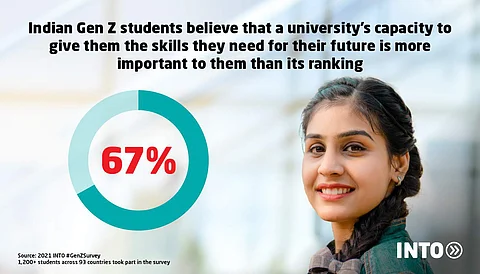

Students are shifting their focus from rankings to degree outcomes when applying to universities abroad, a global survey by INTO University Partnerships reveals. The survey conducted by the international education organisation shows that 67% of Indian students under the age of 25 believe the ability of a university to give them the skills they need to succeed in the future is more important to them than rankings.
Most Gen Z students now place higher value on programmes that will help them become successful when applying to a university. Only a fifth (19%) of the student population still thinks it is important to attend a highly ranked university, even if it is more expensive. The sentiment of Indian students mirrors the global trend as 72% of students worldwide said that they are more interested in degree outcomes. Only 17% still consider rankings a major consideration while deciding on a university.
More than 1,200 Gen Z students from 93 countries participated in the survey that was conducted in August 2021 and focused on the hopes and aspirations of students in the wake of the COVID-19 pandemic. India, China, Nigeria, Kenya, Japan, Australia and Brazil were represented, among other countries.
Let's be practical
“The COVID-19 pandemic has instilled a sense of pragmatism in Gen Z students. Rather than yearly rankings, they are looking for concrete evidence that higher education institutions will help them find long-term success in their careers and lives,” said Olivia Streatfeild, CEO of INTO University Partnerships.
“The survey shows Gen Z is not just looking at outcomes for themselves but is also assessing universities on their credentials on social issues they feel strongly about. This represents a generational shift — one that universities and the international education sector must prepare for as we navigate into the new normal,” she added.
Is studying abroad the 'new normal'?
Student mobility is defining global higher education. Millions of students leave home every year to study abroad. In 2019 alone, 6.2 million students crossed borders for higher education. The global economic impact of international students is estimated to be in excess of 350 billion USD.
“Indian students are among the largest populations of overseas students in popular study destinations. They are in sync with their global counterparts in what they want out of their international degree. They want to be fully equipped to succeed in an increasingly competitive world and they are looking beyond rankings as they see themselves as changemakers,” said Diwakar Chandiok, Recruitment Director, South Asia, INTO University Partnerships.
Leading with a purpose
In addition to being practical, Gen Z students are more purpose-led in their pursuit of higher education abroad as a result of the pandemic. Alongside degree outcomes, 86% of Indian students are considering an institution’s track record on issues such as gender equality, LGBTQ+ rights and racial justice when applying to a university. An overwhelming 88% seek an international degree so that they can one day make the world a better place. “No one person can make a change but we can do so unitedly,” said a Gen Z student from India, who is studying abroad this year.
Substance over style
Gen Z make up 30% of the global population and they constitute the largest share of the pool of prospective students. The survey makes clear that young people are opting for substance over style. Only 27% of respondents in India (35% globally) report that they prefer to purchase branded products.
“Hyperconnected as they are, Gen Z understands how the pandemic has deepened inequalities worldwide. Young people’s exposure to these challenges has galvanised them to act as catalysts of change — further proof of their resilience and resolve in the face of adversity. Helping students study abroad today means giving them the global perspective they need to address the world’s toughest problems tomorrow,” said Streatfeild.
The survey further confirms a strong activist bent of mind among young people, 40% of whom have become more concerned about unemployment since the onset of COVID-19. Another 49% of Indian respondents have shown concern over climate change and global warming and 36% over any sort of discrimination. Gen Z also feels a great personal responsibility for enacting the change they want to see in the world — 39% think it is up to them and their generation to solve social issues. “I believe that as individuals, we have our own role to play in reducing economic inequality,” said a Gen Z student from Indonesia, who is studying abroad this year.
